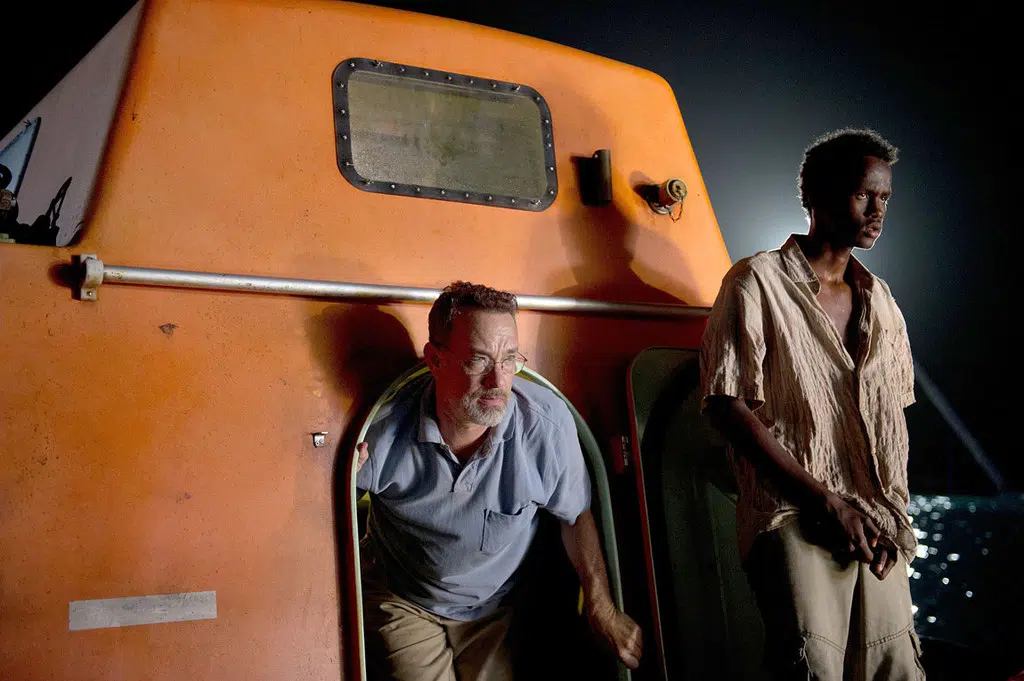NEW YORK – Docudramas tend to underwhelm emotionally, intellectually or both. That’s not the case with “Captain Phillips” (Columbia), a complex and compassionate film that engrosses from the start and builds inexorably toward a devastating conclusion. Prepare to be hooked.
Considered alongside his 2006 project “United 93,” about the airplane that crashed into a Pennsylvania field on 9/11, this movie establishes director Paul Greengrass as a master of the docudrama format. Not only does he skillfully re-create a harrowing maritime ordeal, he keeps the humanity of all those concerned in the foreground. Exhibiting a rare combination of empathy and technical virtuosity, the picture highlights numerous moral dilemmas without passing conclusive judgment on any of them.
Tom Hanks, perhaps the most reliable Everyman in the history of cinema, portrays Richard Phillips, the American skipper of a container ship who was kidnapped by Somali pirates off the horn of Africa in 2009. As Phillips and his wife, Andrea (Catherine Keener), drive to the airport from their Vermont home in the first scene, the tension is already profound. Then we’re shown male villagers on the coast of Somalia preparing to target vessels in international waters.
When Phillips’ command, the Maersk Alabama, leaves Oman with a crew of 20 en route to its first port of call, Mombasa, Kenya – where it will unload humanitarian supplies – an encounter between the two sides becomes inevitable. Mindful of increased pirate activity, Phillips focuses on security, but water hoses constitute his unarmed crew’s primary defense.
Led by a skinny man called Muse (Barkhad Abdi), four fishermen-turned-pirates board the Alabama and eventually take Phillips hostage on a lifeboat. A U.S. naval task force responds. Its mission is to intercept the boat before it reaches the Somali coast and Phillips is ransomed for millions of dollars. After a Navy SEAL team arrives, the situation devolves into one of desperation for the Somalis – and for Phillips.
Being aware of the general outcome doesn’t diminish the intensity for viewers. A surprising amount of emotion is wrung from the story and many resonant themes bob to the surface. These motifs cluster around one form of power disparity or another – economic, military and interpersonal. And the vulnerability of each party is keenly felt at some point.
There are moments when it seems on the verge of striking a triumphal note, but “Captain Phillips” never trumpets American military might. Nor are the Somalis demonized. They’re motivation is money, not a terrorist ideology, and they answer to a warlord. For their part, the American forces act at the behest of politicians.
Greengrass and screenwriter Billy Ray, who based the script on Phillips’ memoir – written with Stephan Talty – home in on the emotional heart of each scene. Although there’s no reason to doubt its accuracy, fealty to the facts, or at least the facts according to Phillips, becomes a secondary concern as artistry supersedes genre distinctions.
Henry Jackman’s intrusive score is the only major flaw. By trying to carry too much of the expressive burden, the music threatens to overwhelm the experience. Still, other aspects of the production, such as taut editing and cinematography and sterling acting, diminish the negative impact of the aural onslaught.
Hanks delivers one of his most nuanced performances. Often when interacting with his captors, it’s unclear whether Phillips is being wily or considerate, scheming for his release or behaving altruistically. This uncertainty adds another layer of depth. And Abdi’s memorable turn as Muse provides a fascinating counterweight to the title character.
“Captain Phillips” leaves the viewer with mixed feelings yet few unanswered questions. Its equanimity and determination to keep everyone’s humanity intact, even those who lose their lives, implies that human beings are always the most precious cargo, no matter the circumstances.
Because its fair and empathetic treatment provides a model for processing the events depicted, “Captain Phillips” is probably suitable for older teens, the elements listed below notwithstanding.
Watch out for: The film contains numerous menacing sequences, several violent episodes with nongraphic bloody images, substance abuse, two instances of profanity and three uses of crass language.
Rated: A-III, adults; MPAA: PG-13, parents strongly cautioned. Some material may be inappropriate for children under 13.
John P. McCarthy is a guest reviewer for Catholic News Service.



